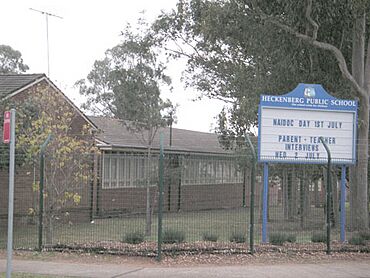Heckenberg, New South Wales facts for kids
Quick facts for kids HeckenbergSydney, New South Wales |
|||||||||||||||
|---|---|---|---|---|---|---|---|---|---|---|---|---|---|---|---|

Heckenberg Public School
|
|||||||||||||||
| Population | 3,094 (2016 census) | ||||||||||||||
| Postcode(s) | 2168 | ||||||||||||||
| Location | 36 km (22 mi) south-west of Sydney CBD | ||||||||||||||
| LGA(s) | City of Liverpool | ||||||||||||||
| State electorate(s) | Liverpool | ||||||||||||||
| Federal Division(s) | Werriwa | ||||||||||||||
|
|||||||||||||||
Heckenberg is a suburb located in south-western Sydney, New South Wales, Australia. It's about 36 kilometres (22 miles) south-west of the main city area of Sydney. This friendly neighbourhood is part of the City of Liverpool.
Heckenberg's Story
Heckenberg got its name from a family who were among the first to settle there. The Heckenberg family arrived in the area before 1840. Casper Theodore Heckenberg, born in England in 1810, was a skilled sailor. He used to sail ships between Sydney and Port Stephens, helping with the timber trade.
The Heckenberg family bought land near Liverpool. Some of the Heckenberg sons became very famous for their woodchopping skills. James William Heckenberg even became the champion woodchopper for Australia and New Zealand around the year 1900! There were eight brothers and one sister in this talented family.
Heckenberg was developed as part of the Green Valley housing project. This area was divided into smaller blocks for homes in 1960. A post office opened in Heckenberg on 1 July 1965, but it closed down in 1986.
Learning in Heckenberg
Heckenberg has a local school for younger students:
- Heckenberg Public School
Who Lives in Heckenberg?
In 2016, about 3,094 people lived in Heckenberg. The average age of people living here was 32 years old, which is younger than the average age for all of Australia (38 years).
Heckenberg is a diverse place!
- About 51.4% of the people living in Heckenberg were born in Australia.
- Other countries where people were born include Vietnam (10.0%), Lebanon (4.7%), and Iraq (3.2%).
- While 36.7% of people spoke only English at home, many other languages are also spoken. These include Arabic (18.2%) and Vietnamese (15.0%).
- The most common religions in Heckenberg are Catholic (20.5%), Islam (19.0%), and Buddhism (12.6%). About 13.1% of people said they had no religion.
 | Emma Amos |
 | Edward Mitchell Bannister |
 | Larry D. Alexander |
 | Ernie Barnes |

